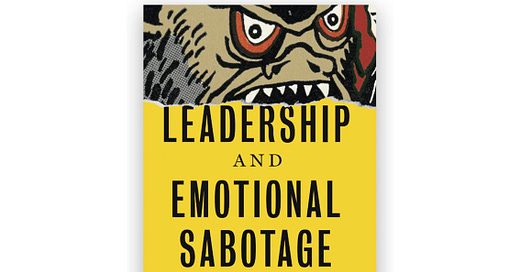Rigney, Joe. Leadership and Emotional Sabotage: Resisting the Anxiety That Will Wreck Your Family, Destroy Your Church, and Ruin the World. Moscow, ID: Canon Press, 2025. 107 pages. List price ($17.95).
Information and purchase link on Amazon: https://a.co/d/aYy9NQa
Summary
Joe Rigney assesses our present cultural and societal state in America by saying, “we live in an age of angst and agitation, marked by fierce anxiety storms that shoot through society, and reactive social stampedes that trample everything in their path… [H]ardly anyone takes responsibility for themselves, their emotions, their actions, and their situation.”[1]
Like a good doctor, Rigney diagnoses the disease and offers what he believes is a remedy. He has intentionally adapted and condensed Edwin Friedman’s description of a “well-differentiated” leader.[2] Rigney (citing Friedman) says,
“[A well-differentiated leader is] someone who has clarity about his or her own life goals and, therefore, someone who is less likely to become lost in the anxious emotional process swirling about. I mean someone who can be separate while still remaining connected and, therefore, can maintain a modifying, non-anxious, and sometimes challenging presence. I mean someone who can manage his or her own reactivity in response to the automatic reactivity of others and, therefore, be able to take stands at the risk of displeasing.”[3]
Rigney’s aim in this book is to “do justice to Friedman’s insights while grounding them in the Scriptures, and extending and applying them in the home, the church, and the world.”[4] Rigney’s “cure” is a “threefold” prescription: rightly ordered relationships, rightly ordered souls (i.e., sober-mindedness or the clear-eyed application of biblical ethics), and the rightly ordered worship of the one true God through Jesus Christ.
Rigney wants Christians (especially Christian men) to be “grounded in the glory of God,” so that they “possess clarity of mind, stability of soul, and readiness to act.”[5] In short, he wants to urge “mature, sober-minded leadership,” and he wants to see this applied thoroughly in the home, in the church, and in the world.[6]
Evaluation
As leadership books go, this one is different than most. Rigney does not offer strategies for leaders to persuade followers, he does not provide the reader with time-management or self-improvement goals, and he does not seem to prioritize results much at all. In this sense, Rigney’s book is far more Christian and biblical than it is pragmatic. And yet, it is immensely practical. One can hardly think of a more practical need than basic order and stability in relationships, in the soul, and in one’s way of life.
It is easy to hear echoes of the book of Proverbs throughout Rigney’s book. The biblical book on wisdom is intended to give the reader two ways to live – the way of wisdom or the way of foolishness.
The way of wisdom is defined by a fear of God (Prov. 1:7), and it is ordered by godly principles and ethics. It is not swayed by circumstance, it is content to honor God with the opportunities given, and it leads to genuine joy and blessings.
On the other hand, the way of foolishness is defined by a fear of man. It is ordered (or rather disordered) by momentary passions and all sorts of gut-level desires. And the way of foolishness leads to discontent, chaos, and death.
Recommendation
As Christians in America look around to see the effects of foolishness, passions, and disorder, it is refreshing to read such a direct and clear description of biblical manhood and leadership. Of course, men and women may both benefit from reading this short book, but this book may be especially helpful for young men who have not been taught or shown what it looks like to live well in a fallen world.
Rigney’s book is a great place to begin, it may even serve well as an evangelistic tool for young men who inherently know that they are not living up to their potential and who are eager to learn that there is a better way. In fact, I recommend that men follow Rigney’s book with an older one by J. C. Ryle – Thought for Young Men.
May God help Christian men to walk the way of wisdom, to be sober-minded, and to lead well so that others may benefit from their leadership. And may God raise up more Christian men from among those who are now rebelling against God’s good design and suffering from their foolish ways.
[1] Rigney, Leadership and Emotional Sabotage. p. 1.
[2] Rigney, Leadership and Emotional Sabotage. p. 3.
[3] Rigney, Leadership and Emotional Sabotage. p. 3. See also Edwin H. Friedman, A Failure of Nerve: Leadership in the Age of the Quick Fix, rev. 2. (New York: Church Publishing, 2017), 65.
[4] Rigney, Leadership and Emotional Sabotage. p. 5.
[5] Rigney, Leadership and Emotional Sabotage. p. 39.
[6] Rigney, Leadership and Emotional Sabotage. p. 39.



